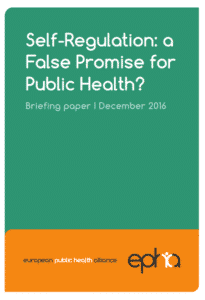Self-regulation is a commonly promoted governance tool in public health policy-making, including in the domain of alcohol and food. This paper addresses the evidence on the effectiveness of self-regulation for attaining health objectives, its potential wider effects on public governance and the future role of self-regulation in health policy.
Findings include that voluntary commitments are generally not designed to maximise health benefits, lack credible enforcement mechanisms, provide limited additionality and are usually vague and permissive, making it difficult to monitor and compare.
Based on available evidence, there is no justification for endorsing self-regulation as policy mechanism to deliver public health objectives.
While voluntary activities by economic operators can bring positive contributions, there is no ground for anchoring public health policy in such initiatives.

